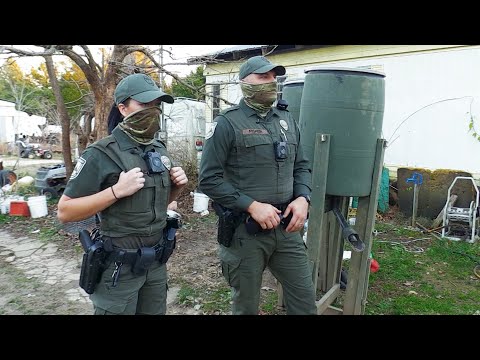Protect Wildlife: Conservation Officer Job & Salary

Conservation Officer Job Description Template
A Conservation Officer is a professional who is responsible for protecting and managing natural resources and wildlife in a designated area. They work closely with government agencies, landowners, and the public to ensure compliance with laws and regulations related to conservation. One important aspect of a Conservation Officer’s job is enforcement of environmental laws. They patrol the area they are assigned to, investigate reports of illegal activities such as poaching or illegal logging, and gather evidence to build cases against violators. They may also conduct surveillance operations, use tracking techniques, and work with other law enforcement agencies to apprehend offenders. Another crucial responsibility of a Conservation Officer is education and outreach. They play a vital role in raising awareness among the public about the importance of conservation and the need to protect natural resources. They may organize workshops, give presentations, or participate in community events to educate people about environmental issues and promote responsible behaviors. Conservation Officers also monitor wildlife populations and habitats. They collect data on species distribution, population size, and habitat conditions to evaluate the health of ecosystems. This information helps in developing conservation plans and making informed decisions regarding hunting seasons, fishing regulations, and land use policies. In addition, Conservation Officers may be involved in habitat restoration projects, where they work to rehabilitate damaged ecosystems and improve wildlife habitats. They may collaborate with landowners and other stakeholders to implement conservation measures such as reforestation, wetland restoration, or invasive species control. Overall, the work of a Conservation Officer is essential for the protection and preservation of our natural resources. Their dedication and efforts contribute to maintaining the balance of ecosystems and ensuring the sustainable use of our environment for future generations.Conservation Officer Responsibilities
Conservation Officer Requirements
How Much Does A Conservation Officer Make?
Conservation Officer Salary
| Position | Salary Range |
|---|---|
| Conservation Officer I | $40,000 – $50,000 |
| Conservation Officer II | $50,000 – $60,000 |
| Conservation Officer III | $60,000 – $70,000 |
| Conservation Officer IV | $70,000 – $80,000 |
A conservation officer is responsible for enforcing laws and regulations related to wildlife conservation and environmental protection. They work to conserve and protect natural resources such as forests, rivers, and wildlife habitats. Conservation officers often collaborate with other agencies and organizations to ensure compliance with environmental laws and educate the public on conservation efforts. The salary of a conservation officer varies based on their position and level of experience. The above table provides an overview of the salary ranges for different levels of conservation officers.
Conservation Officer Salaries by Country
Top Paying Countries for Conservation Officer
| Country | Average Salary (USD) |
|---|---|
| United States | 60,000 |
| Australia | 55,000 |
| Canada | 50,000 |
| United Kingdom | 45,000 |
| New Zealand | 40,000 |
Conservation officers play a crucial role in protecting and preserving natural resources and wildlife. The salaries of these professionals can vary depending on the country they work in. According to the data, the top paying countries for conservation officers are the United States, Australia, Canada, the United Kingdom, and New Zealand. In the United States, conservation officers earn an average salary of $60,000, making it the highest paying country for this profession. Australia follows closely with an average salary of $55,000, while Canada, the United Kingdom, and New Zealand offer average salaries of $50,000, $45,000, and $40,000, respectively. These salaries reflect the importance and value placed on conservation efforts in these countries.
A video on the topic Conservation Officer
Video Source : KYAfieldInterview Questions for Conservation Officer
1. What is the role of a Conservation Officer?
A conservation officer is responsible for enforcing wildlife and environmental laws, managing natural resources, conducting investigations, providing education and outreach programs, and ensuring the conservation and preservation of natural habitats.
2. What qualifications and skills are required to become a Conservation Officer?
To become a conservation officer, one typically needs a bachelor’s degree in natural resource management, environmental science, or a related field. Strong communication, problem-solving, and interpersonal skills are essential. Additionally, physical fitness and knowledge of wildlife and environmental laws are important.
3. Can you describe a typical day in the life of a Conservation Officer?
A typical day for a conservation officer involves patrolling designated areas to enforce wildlife and environmental regulations, conducting investigations on potential violations, assisting with animal rescues, providing educational programs to schools or communities, and maintaining records and reports related to conservation activities.
4. How do you handle conflicts between wildlife conservation and human activities?
When conflicts arise between wildlife conservation and human activities, a conservation officer aims to find a balance that ensures the protection of wildlife while addressing the needs and concerns of the community. This may involve implementing management strategies, providing education on coexistence, and working with other stakeholders to develop sustainable solutions.
5. Can you give an example of a successful conservation project you have been involved in?
One successful conservation project I was involved in was the restoration of a local wetland habitat. We collaborated with community members, environmental organizations, and government agencies to remove invasive species, replant native vegetation, and improve water quality. As a result, the wetland ecosystem flourished, attracting a diverse range of wildlife species.
6. How do you stay updated on the latest wildlife conservation practices and regulations?
To stay updated on the latest wildlife conservation practices and regulations, I regularly attend workshops, conferences, and training sessions organized by relevant government agencies and conservation organizations. I also engage in continuous learning by reading scientific publications and participating in online forums and discussions.
7. How do you educate the public about the importance of wildlife conservation?
As a conservation officer, I educate the public about the importance of wildlife conservation through various means. This includes organizing public presentations, workshops, and events, creating educational materials such as brochures and posters, collaborating with schools to develop curriculum-based programs, and utilizing social media platforms to reach a wider audience.
8. How do you handle situations involving illegal hunting or poaching?
When encountering situations involving illegal hunting or poaching, I prioritize the safety of individuals involved and gather evidence to support potential prosecutions. This may include conducting surveillance, interviewing witnesses, collecting samples, and coordinating with law enforcement agencies. I also work closely with prosecutors to ensure that appropriate charges are filed and offenders are held accountable.
9. What are some challenges you face as a Conservation Officer?
Some challenges faced by conservation officers include encountering resistant individuals who do not comply with wildlife and environmental laws, dealing with difficult weather and terrain conditions during patrols, managing conflicts between different stakeholder groups, and staying updated on constantly evolving regulations and management practices.
10. What personal satisfaction do you derive from working as a Conservation Officer?
Working as a conservation officer provides personal satisfaction in knowing that I am actively contributing to the protection and preservation of our natural resources and wildlife. I find fulfillment in educating the public, witnessing positive changes in ecosystems through conservation efforts, and knowing that future generations will be able to enjoy and appreciate the beauty of our environment.






